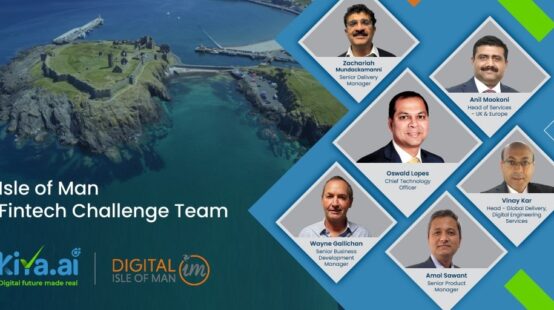
If you’ve never heard global fintech expert David Birch speak publicly, I can heartily recommend it. Not only does he talk in an engaging and entertaining way on subjects that could best be described to non-techies as ‘a bit dry’, he’s an authority on one of tech’s holy grail subjects – creating tech solutions that genuinely make the lives of people better.
He’s chairing the first panel debate at this year’s Digital Jersey TechWeek, where he’ll be discussing the latest developments in regtech.
If you caught his talk from 2018, you’ll know that David has a real enthusiasm for creating a digital infrastructure that’s fit for purpose in today’s world so it can solve real world problems, such as preventing people being ripped off online and issues of compliance that stem from mismatched infrastructure.
Two years on, how does he think the industry is doing in solving those problems?
“It’s a bit of a mixed bag, really,” he tells me.
“The big answer is ‘not terribly well’. In terms of dealing with my hobby horse, which is trying to create an actual digital infrastructure for the new economy, rather than trying to have a digitised version of what we’ve already got, I have to say progress is a bit slow.”
He cites a real-world example where Companies House announced reforms intended to clamp down on fraud and money laundering, with directors unable to be appointed until their identity has been verified.
“It’s 25 years since the internet got underway and we still can’t tell whether someone is real or not. I think in that way we haven’t had much progress.”
Compliance is another area where infrastructure isn’t keeping up. If you’re unfamiliar with what compliance is and why it exists, it’s the goal that organisations aspire to achieve so that they’re aware of and adhere to relevant laws, policies, and regulations.
“The costs of compliance are just spiralling out of control. The massive amounts of money that we are spending on compliance are really not working, so we need a re-think on that. In terms of protecting people, I don’t think we’ve got terribly far.”
Where does he think the problem stems from?
“We’ve spent too much time trying to think of ways to emulate the existing structures to make virtual models of what we’ve already got and not enough time re-thinking from first principles ‘what do we actually want?’.
“In the case of financial services, which is the focus of what I’m talking about, I think it’s a reasonable criticism that we need a financial services infrastructure for the new economy.”
It seems that despite best efforts, the solution could be further away than we think.
“It still seems ridiculous to me that in the case of Jersey, where the efficiency of the jurisdiction as well as the transparency and the excellent regulation are part of its selling point, it seems crazy to me that every time you go to any kind of financial institution, any kind of advisor, it’s like you just got off the boat again and you’ve got to start from scratch providing all of your personal details, having everything checked.
“I probably sound a bit critical but I stand by it and I think those criticisms stand up to scrutiny.”
An idea that deserves re-visiting, he says, is that of a digital onboarding passport.
“Imagine first setting foot in Jersey, I go to my open my first bank account and they do a very thorough and rigorous and strict Know Your Customer, Anti-Money Laundering, Counter Terrorism Financing checks. And then they give me a sort of passport. And then when I go to open my next bank account, or get an accountant or a lawyer, I can show them that passport and they don’t have to start all over again.
“This has been discussed in Jersey before and I think it’s time to revisit it. It’s a sound idea in general.”
It would certainly save time and solve the problem of having to prove your identity every time a person wants to interact with financial services providers, but there’s the perennial issue of human nature to factor in. Forgotten passwords on the customer side and on the other, fraudsters attempting to buck the system.
“I don’t minimise the inventiveness of the criminals, I just think we need to be more efficient in dealing with them.
“I come from the technical side of things, so I look at things like Apple filing patents about identity management in iPhones and that sort of thing and I see that the technology is coming along to make things easier.
“And I see things like the Financial Action Task Force saying there’s new regulatory opportunities opening up, so in the middle there must be an opportunity for financial institutions to put those two things together and come up with better ways of doing business and providing better services for the customer. For somewhere like Jersey I think that’s part of a bigger strategy around jurisdictional competition.”
He says there are opportunities where Jersey can utilise strengths it already has to capitalise in these areas.
“Three years ago we would sit round and talk about fintech, what can Jersey do with fintech. That’s already fragmenting into different kinds of opportunities, regtech, insuretech, these kinds of things. So I think the first thing is not be too narrow in this kind of thing.
You have to talk about what’s realistic and actually regtech is an area where Jersey could do something.
“Because if you put together the expertise in those other services, compliance and those kinds of things, auditing and that kind of thing…If you look at what’s going on in the world of artificial intelligence, machine learning, the ability to augment people doing those jobs so they can do them more efficiently, is really pretty interesting.
“So having got things off the ground in fintech, the next steps are to look at targeting and refining the specialisations around insuretech and regtech. And I think some of the vision that Digital Jersey has got, as using the island as a sandbox for some of these kinds of things, because of the communications infrastructure, because of the broadband because of the 5G, to me that seems pretty realistic so I think that’s a good focus for the next evolution.”



